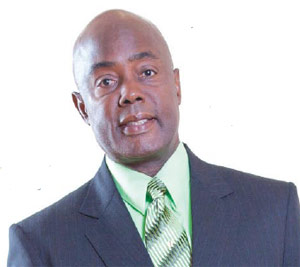 |
 |
 |
|
June 2013
|
‘Fifty years ago, UWI was the only tertiary academic institution in Trinidad & Tobago. Today The University is being challenged to operate in a new competitive environment with more than 10 other institutions providing educational options.’\ Immediately prior to coming back to St Augustine, Saunders was Managing Director of a local firm involved in property development, project management, real estate and design/build of recreation and sporting facilities. In addition to his BSc, Engineering from The UWI, he completed an MSc in Electronic Instrumentation at the University of Wales, Swansea. All of his interests, experience and expertise come together to fit him for the role of Registrar who is, in effect, a university’s chief operating officer. A chief operating officer’s job is no easy task and even more so in face of today’s challenges: ‘The UWI has to reduce reliance on state support and expand private and corporate donations, strategically manage endowments, as well as generate revenues from research opportunities. These shifts, he says, decisively redefine the role of The University’s administrative officers, who must become engaged in more active and strategic management of the institution.’ A student population of 19,000, averaging 4,000 undergraduates and 2,000 graduates annually, translates into very many student transactions happening at any point in time. He is very aware that the administrative personnel share responsibility with the Faculty for the experiences in higher education and have an important support function in helping to ensure excellence in the educational experience. ‘Administrative personnel must therefore work with the academics and lead in efforts to better serve our students, our communities, the Caribbean and our global society.’ Saunders’ training makes him analytical, his experience in management makes him aware that while The UWI is embarking on an exciting period to make it 21st century ready with a global reach, the transformation must be carefully planned and executed. “The UWI is a laboratory of cultural diversity, representative of the Caribbean. We have to work in teams but remotely. At the same time we are setting a framework to produce a graduate who can be a good player in any market.” He has a list of things needed to fast track The UWI St Augustine into an internationally recognised university of choice: new and more flexible learning spaces, online information and library services, widely accessible computing facilities, wired residence facilities and an increasing array of lifelong learning programmes and services, are just a few of the items on his wish list. This ambitious agenda is aimed at positioning The UWI to attract students from a wider pool, penetrating the ACS countries, beginning with Guyana, Suriname and Curacao. ‘The University has no choice but to adapt to the changing environment. It must become market and value driven to survive. We need therefore to review our relationship with our students, visitors, retirees, alumni, donors, policy makers and the general public.’ Employee engagement assumes vital proportions in this scenario. The goal: to build a sense of ownership, of team, of One Caribbean. The UWI is a regional institution, not four separate campuses and the thinking as well as the action must reflect that thrust. Saunders indicated that well developed leadership capacities are essential in any organization. However, he noted, the leadership challenges in higher education are more complex and difficult than in the private sector. ‘In the private sector reporting lines are clearer, you know you are pursuing profits and the revenue objectives are more clearly defined. People in leadership roles in the private sector have ways of incentivising their staff and sanctions to motivate and encourage change, advancement and innovation. Leadership in the University environment is more challenging. You must be prepared to engage in collaboration and ensure all are consulted and involved to avoid resistance to implementation.’ Saunders draws on his pan playing days to make an analogy: ‘in an organisation like this, a lot of things happen at the same time and you have to keep your focus – which is the job of the rhythm section in a steelband. The people of the Registrar’s office are the rhythm section of The UWI; we’ll keep the beat through transformation and beyond.’ |


 For the new Registrar, Richard Saunders, it’s a bit like returning home but on the other side of the fence. In his undergraduate days as an engineering student, he served as vice president of the Guild of Undergraduates. Another big change for The UWI graduate is the current tertiary education environment.
For the new Registrar, Richard Saunders, it’s a bit like returning home but on the other side of the fence. In his undergraduate days as an engineering student, he served as vice president of the Guild of Undergraduates. Another big change for The UWI graduate is the current tertiary education environment.